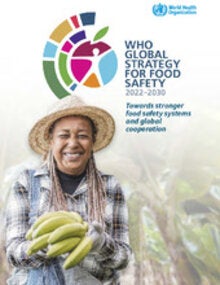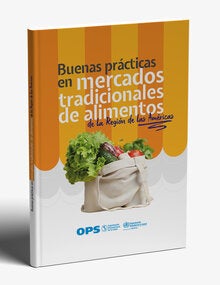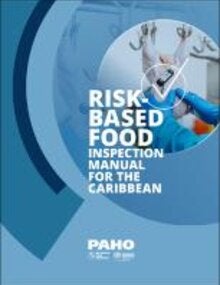ONE HEALTH - Action Track 4
Strengthening the assessment, management and communication of food safety risks
Action track 4 “Strengthening the assessment, management and communication of food safety risks” focuses on the prevention and control of foodborne illnesses. The safety of food is inextricably linked to where it is grown (environment), how it is grown (human-animal-environment interaction) and, how it is consumed (human interaction). Humans need safe food and water to maintain their vital functions. Food safety cannot be conceived without a One Health approach and countries need to develop an integrated approach to prevent any risks emerging along the food value chain “from farm to fork”.
Promoting intersectoral coordination at the regional, national, and local levels is essential for the implementation of effective and sustainable strategies to promote food safety, considering the health of humans, animals, and the environment throughout the entire food chain, from production to consumption. Food Safety strategies need to be underlined by risk analysis principles to scientifically assess potential food safety risks, manage the identified risks effectively, and communicate those risks adequately to industry, consumers, and trade partners.
Technical cooperation and country experiences
Assessment and Improvement of National Food Control Systems
National Food Control Systems of El Salvador (2018), Costa Rica (2018) and Honduras (2021) were assessed using the Performance, Vision and Strategy tool for National Food Safety Services created by PAHO and IICA to identify gaps, opportunities and measures to strength their food control systems. The assessments involve an in-depth analysis of country´s technical capacity, human and financial capital, interaction with the private sector and application of norms and standards to safeguard public health and market access. An updated FAO/WHO Food Control System Assessment Tool was launched in 2019 and applied in the Republic of Panama (2021). The assessments are conducted in close collaboration with all the different stakeholders involved in Food Safety such as the Ministry of Health, Ministry of Agriculture, Ministry of Environment, Ministry of Commerce, National Standards Bureaus, Consumers Associations, the private sector and the academia that work together to develop a country roadmap to improve their capabilities by defining activities, verification means, performance indicators and a timeframe for implementation.
Strengthen Codex Alimentarius Programs
Under the Sanitary and Phytosanitary Agreement (SPS) of the World Trade Organization, members agreed to adopt and enforce measures to protect human, animal or plant health. Food safety norms and standards of the Codex Alimentarius Commission are internationally recognized as providing the appropriate level of protection for human health. Countries in the Americas are receiving technical support to strength their national Codex Alimentarius Programs to adopt/adapt and implement international recognized food safety standards for good practices along the food value chain to prevent food contamination. Under the framework of Codex Trust Fund Projects, Honduras, Bolivia, El Salvador/Guatemala, and Guyana are developing their Codex Contact Point structure, Codex Alimentarius Strategic Plans, Communication Strategy and fostering multisectoral consultation mechanisms for the adoption and implementation of Codex standards. A robust national Codex Alimentarius program also ensures a more effective regional participation in the formulation of international Codex Alimentarius standards that protect consumers and ensure fair trade practices.
Improvement of Food Safety Risk Analysis Capacity in the Americas - Food Safety decisions based on science
Food Safety risk analysis principles underpinned the main functions of national food safety authorities for making evidence-based food safety decisions. PANAFTOSA improves the food safety risk analysis framework in countries in the Americas in each of the three components: risk assessment, risk management and risk communication through training and educational programs. It is worth mentioning the capacity building activities in food safety risk analysis in Bahamas (2021), Guyana (2021) and El Salvador (2023), risk-based food inspection in Latin America (2021), food safety risk communication in the Caribbean (2021) and food safety risk management in Latin America (2023).
PANAFTOSA/VPH is part of the Food Safety Risk Analysis Network (FSRisk), created in 2016 to strengthen food safety risk analysis frameworks in the Latin American and Caribbean region. The network aims at promoting South-South cooperation through the transfer of knowledge and experiences in risk analysis among countries. More recently, PAHO and FAO have been awarded a STDF regional project entitled “Improving food safety risk analysis capacity in Latin America through a South-South cooperation approach to facilitate regional trade” to harmonize science-based risk analysis tools to reinforce regulations, improve risk-based food inspection procedures and sampling plans, and operationalize the FSRisk network.
Inter-American Network of Food Analysis Laboratories
The Inter-American Network of Food Analysis Laboratories (INFAL/RILAA) is a reference technical hub for official food analysis laboratories that promotes and strengthens the technical-scientific competence and collaboration among the laboratories integrated in national food control programs. The network was founded more than 25 years ago and is composed of 140 laboratories from 25 countries.
The network leads four technical working groups in food chemistry, food microbiology, antimicrobial resistance and quality system that hold regular meetings to exchange information and prepare harmonized laboratory procedures and/or guidelines as well as it organizes technical trainings and proficiency tests to support laboratories to achieve ISO/IEC 17025:2017 accreditation. Every two years, the network organizes the ordinary assembly where members define the operational biannual workplans of the network.
Strengthen the capacities of Food Traditional Markets
Food Traditional markets are an essential source for the supply of food in rural, urban and semi-urban areas in low-income and middle income countries in the Americas and are a clear example of the convergence of people, animals, food and environment. Food traditional markets can be a potential source of emergent pathogens. Selected municipalities in Colombia and Dominican Republic received technical support to assess their food traditional markets regulatory framework and the basic infrastructure and hygienic-sanitary conditions to reduce food safety risks. Based on the outcome of a customized diagnostic tool, selected markets could be categorized based on risk and orientations could be provided to the municipalities to develop public policies, workplans, and programs to enhance the hygienic-sanitary capacities of traditional markets. Additionally, a train of trainers’ program was developed to instruct traders, middleman, administrators, and consumers on good practices in food traditional markets.
World Food Safety Day
Every 7th of June, PAHO in coordination with FAO, OIRSA, IICA, and CCLAC celebrates the World Food Safety Day through the organization of a series of regional events and calls for actions. During these events, various activities and campaigns have been conducted to promote awareness of the importance of food safety, highlight challenges and opportunities in this area, and foster collaboration among countries in the region to improve standards and practices related to food safety. These initiatives have been crucial in raising awareness among the population, government stakeholders, the food industry, and other relevant actors about the need to ensure safe and high-quality food for all.
Good practices
- Assess national food control systems to identify gaps, weaknesses, strengths and opportunities and develop roadmaps and programs to improve country´s food safety capacities under One Health approach.
- Promote food safety decisions based on science through the development of training and mentorship programs on food safety risk analysis.
- Provide scientific and technical assistance to strengthen National Codex Alimentarius Programs through multisectoral and coordinated approaches.
- Foster the adoption and implementation of Codex Alimentarius standards and norms “from farm to fork” to prevent the chemical, microbiological and physical contamination of food.
- Support countries to strength their integrated food borne diseases surveillance systems.
- Promote the estimate of the burden of foodborne illness and attribution of illnesses to specific food hazards, to better target prevention and control measures under a One Health approach.
- Improve competent authorities’ capabilities for food safety risk assessment to characterize microbial and chemical food hazards and assess dietary exposure.
- Develop risk communication strategies applied to food safety to manage adverse food safety events associated with biological, chemical or physical hazards.













